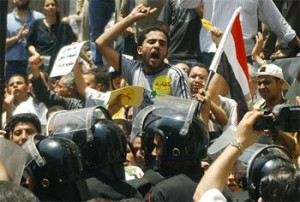
So has the European Union actually backed a winner in Morocco? As the shockwaves from the unexpected uprisings in Tunisia and Egypt spread across the region, Morocco –the only North African country with advanced EU neighbour status– has seen relatively little unrest.
The cynical and ultimately short-sighted European approach to the regimes facing its southern flank was exposed when Tunisians exploded in outrage against a government Brussels had looked on kindly. The French, Italian and Spanish governments were all lobbying for Ben Ali’s regime to be given preferential partner status. Morocco, meanwhile, has made a number of strides towards democracy during King Mohammed VI’s 11-year reign. But appetites have been sharpened across the region. Even if Morocco escapes the wave of revolutionary fervour, the royal house should take it as a warning: stagnation, both socio-political and economic, is no longer a safe option.
Indeed, a number of young people have immolated themselves in a country that bears its share of the regional scourge of high youth unemployment. Among recent Moroccan graduates, joblessness stands at over 25 percent, and it is this collective which makes the most active use of internet and has thus claimed back a power for itself that demographics seemed to have thwarted. In recent years, the young unemployed have regularly demonstrated on the streets and staged other forms of protests – in the main remaining peaceful and being tolerated by the authorities.
The differences with the Tunisian regime, for example, are great in terms of social freedoms: in Morocco demonstrations are not uncommon; NGOs and political parties are active forces; the internet is a genuine outlet for expression; and, despite shameful exceptions such as the persecution of journalist Ali Lmrabet, there is an impressive degree of plurality in the Moroccan media.
But elections and their outcomes are manipulated in more or less subtle ways from the palace, with the focus in recent votes being on keeping the PJD moderate Islamists from winning an outright victory (the banned Islamist movement of Sheikh Yassine is often said to be a potentially greater force, although this assertion is hard to corroborate). The fundamental check against genuine democracy in Morocco is the political role of the king, who appoints the government. For all his caché as a reformer, Mohammed VI has shown little willingness to loosen the iron grip his father handed on to him, continuing to retain key ministerial posts for his own trusted acolytes.
Then there is corruption. Mohammed VI may not be a ruthless dictator as Hassan II was before him – but he may be more rapacious. The contents of a US Embassy cable from December 2009 and recently made public by WikiLeaks are damning: “While corrupt practices existed during the reign of King Hassan II … they have become much more institutionalized with King Mohammed VI. Institutions such as the royal family’s holding company, Omnium Nord Africaine (ONA), which now clears most large development projects, regularly coerce developers into granting beneficial rights…”
In recent days, Rabat has moved to ease the heavy economic burden current global conditions impose on Moroccan families, boosting existing subsidies on basic foodstuffs and fuel. As in Egypt, food prices have historically been the touch paper for unrest. The Western Sahara standoff and the recent explosion of violence in that disputed territory is a massive drain on the economy, Morocco’s outlay on pacifying the region and bolstering its administrative framework there accounting for an estimated seven percent of GDP. The danger now is twofold: fuel prices and global shortages lead to general price increases which Rabat cannot afford to disguise with subsidies; increased hardship transforms murmurings over corruption and bad governance into a cry of rage, amplified by the confidence borrowed from the Tunisian and Egyptian revolts.
Mohammed VI: the jet-setting monarch
But ultimately, Mohammed VI has far less potential to become a hate figure, even for young, educated Moroccans who have no time for the blind allegiance their forebears showed to Hassan II. He is seen as a young king with a mixture of good intentions and expensive tastes, and one who spends too much time jetting from one resort to another to be personally responsible for the evils of the land. He is no Mubarak or Ben Ali. But as the region’s other dictators have mostly been seen grooming a son or relative to take over power, Mohammed VI seems to be encouraging the rise to (prime-ministerial) power of his boyhood friend and former Interior Ministry official, Fouad Ali el Himma, who recently set up his own Party of Authenticity and Modernity in order to agglutinate moderate political forces. El Himma is named in the same WikiLeaks cable as one of just three men in Morocco who make the country’s “major investment decisions”, along with “the head of the King’s private secretariat, and the King himself”.
It is impossible not to sense a decline in reformist zeal in the second half of Mohammed VI’s decade in power. Yet, the final report of the truth commission, which he himself set up to hear testimony of human rights abuse victims from his father’s reign, laid down the path to follow with its broad recommendations for a complete separation of powers in Morocco. Now would be a good time to revise the country’s power structures. As Egypt and Tunisia have shown, digging in seems an increasingly unviable option.
Leave a Reply
You must be logged in to post a comment.